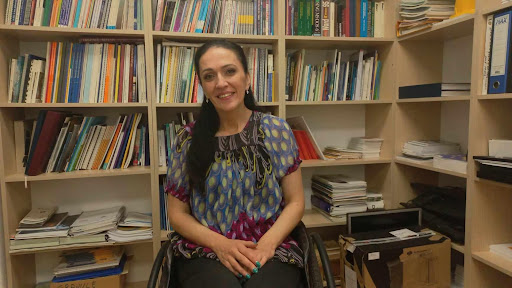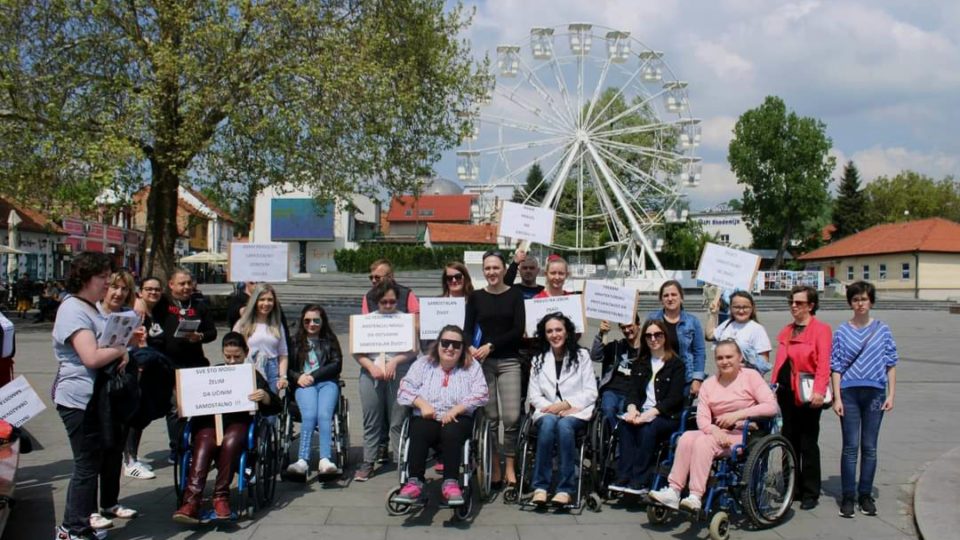
The Tuzla Canton Women with Disabilities Forum was established within the framework of the “Here I am – Visible and Proud” project. Working with women with disabilities, it aims to bolster their self-confidence, familiarize them with the experiences of victims of violence, and advocate for their reproductive health, right to education, and similar issues. Some of these initiatives are carried out through performances, such as “Silences,” which was based on the personal stories of women with disabilities.
According to the 2013 Census, 176,499 women with disabilities live in the Federation of Bosnia and Herzegovina. Despite this considerable number, the participation of these women in public life, as well as in organizations for persons with disabilities, remains remarkably low.
Adisa Kišić, the project coordinator of “Here I am – Visible and Proud,” says that women with disabilities are discriminated against in a variety of ways. Their potential is often overlooked, including as mothers and wives, and they are not generally acknowledged as sexual beings.
“Women with disabilities are not sufficiently encouraged to look after their reproductive health or undergo regular examinations. There is no adequate, adapted medical equipment for examining women with disabilities, and they’re discouraged from taking care of their health,” said Kišić.
Kišić asserts that disability increases the risk of experiencing violence, be it physical, economic, or psychological. She notes that in many cases, people with disabilities aren’t even aware that they are victims of violence.
Kišić emphasizes that women with disabilities are also denied access to education, even by their own families, due to the fear of losing disability benefits. This results in a significant number of people with disabilities remaining uneducated, further hindering their ability to find employment and achieve independence from their families.
Through the Women with Disabilities Forum, Kišić explained that they have witnessed very low levels of self-confidence among new members. For this reason, one of the goals of the Women with Disabilities Forum and “Here I am – Visible and Proud” project is to nurture the self-confidence of its members and help them recognize violence in their lives. This is achieved through various workshops and educational activities, including sessions on the rights of people with disabilities.

“The forum teaches them to stand up for themselves,” explained Kišić, adding that women and girls who have participated in these educational programs are more self-confident, have a better understanding of their rights and needs, and are simply “happier.”
Recently, a play titled “Silences” was produced by the forum to raise awareness about the everyday challenges faced by women with disabilities. The script was written and performed by forum members, drawing inspiration from their own personal stories. The second part of the play was interactive, giving volunteers from the audience the opportunity to step into the shoes of the main characters in the scene and portray how they would react in a similar situation. The idea of this element was to illustrate that discrimination against women with disabilities does not have to be the norm.
This play, along with the forum’s other initiatives, was funded by the Swedish International Development Cooperation Agency.
Although Kišić believes that the situation has improved compared to previously and acknowledges the support provided by the Tuzla cantonal government and other FBiH authorities, she says much more is needed to support the work of organizations like this one. The existing financial investment is insufficient to ensure a dignified life for people with disabilities.
Despite being a signatory to the United Nations Convention on the Rights of Persons with Disabilities, Bosnia and Herzegovina has made little progress toward improving urban infrastructure and institutions to make them more accessible to people with disabilities. Many places remain inaccessible, schools lack the necessary assistive devices and personal assistants, and many healthcare devices are not adapted to their needs.
The advances made toward enabling a dignified life for people with disabilities have been made largely thanks to the advocacy of activist groups and associations.
Kišić underscores the need to be partners and collaborators in this mission to ensure that the human rights of people with disabilities are respected, recognizing that everyone needs support in some aspect of their lives. Employers must comply with legal regulations and be open to hiring people with disabilities.






